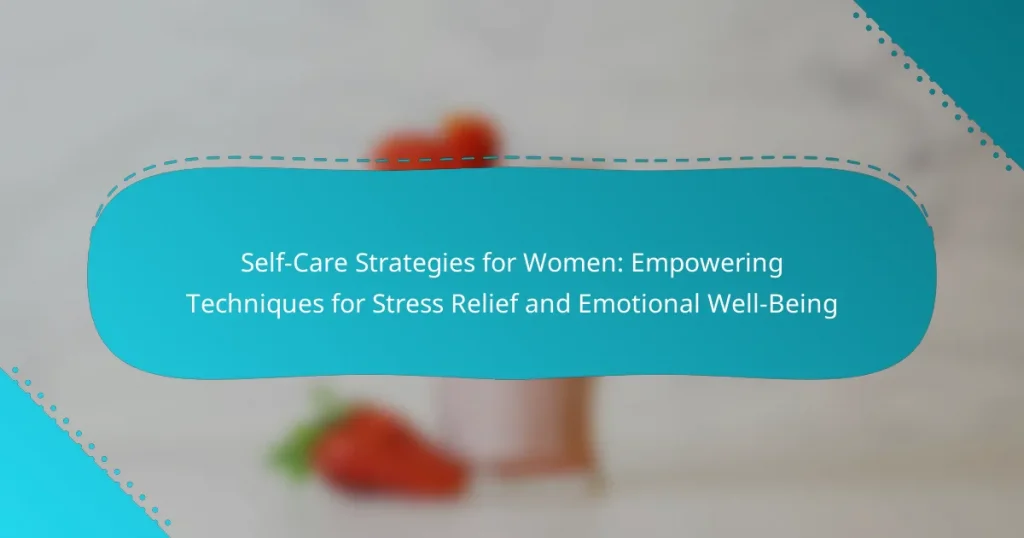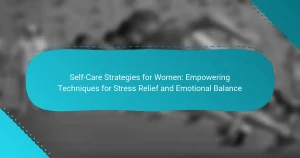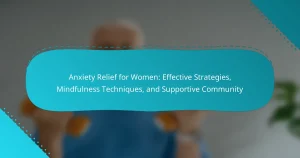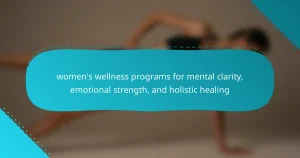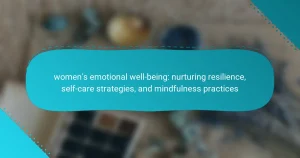Effective self-care strategies are crucial for women seeking stress relief and emotional well-being. Mindfulness practices, such as meditation and deep breathing, promote relaxation. Engaging in physical activity boosts mood and energy levels. Building strong social connections fosters support and reduces feelings of isolation. Incorporating these techniques into daily routines enhances resilience and improves overall mental health.
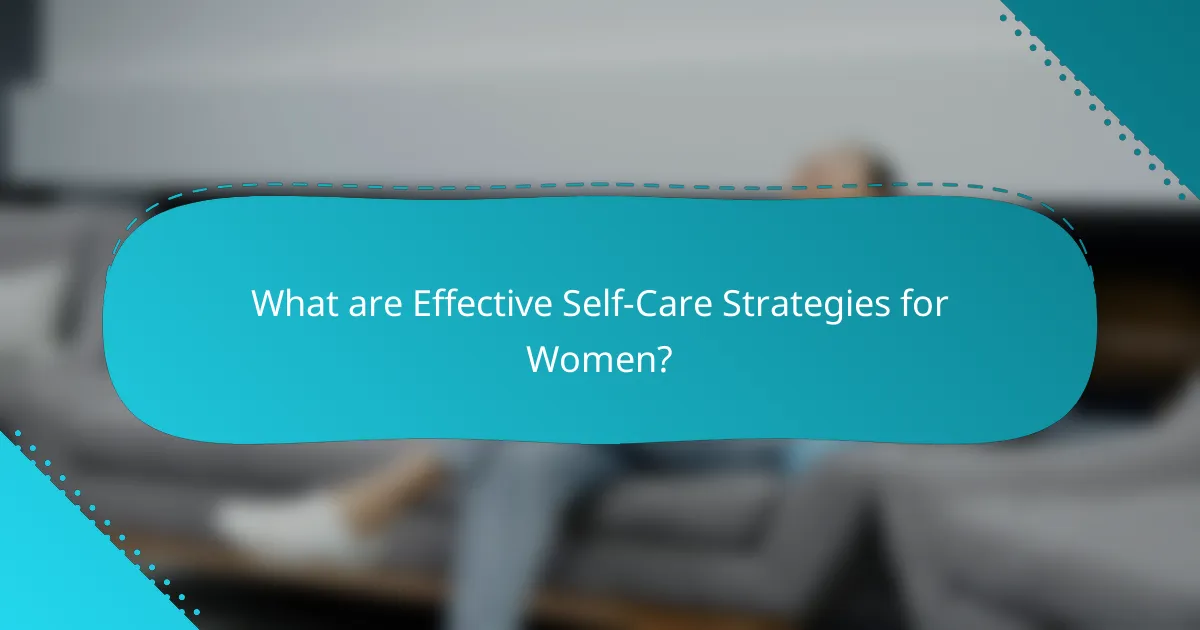
What are Effective Self-Care Strategies for Women?
Effective self-care strategies for women include mindfulness practices, physical activity, and social connections. These techniques enhance emotional well-being and reduce stress effectively.
Mindfulness practices, such as meditation and deep breathing, promote relaxation and help manage anxiety. Engaging in regular physical activity, like walking or yoga, boosts mood and energy levels. Building strong social connections fosters support and reduces feelings of isolation.
Incorporating these strategies into daily routines can lead to significant improvements in mental health and overall quality of life. Prioritizing self-care empowers women to navigate challenges with resilience and confidence.
How do self-care practices impact women’s mental health?
Self-care practices significantly enhance women’s mental health by reducing stress and promoting emotional well-being. Techniques such as mindfulness, exercise, and journaling empower women to manage anxiety and improve their mood. Research indicates that regular self-care can lower the risk of depression and increase resilience. For instance, engaging in physical activity releases endorphins, which are natural mood lifters. Prioritizing self-care fosters a sense of control and personal empowerment, crucial for overall mental health.
What are the most common stressors faced by women today?
Women today face several common stressors, including work-life balance, financial pressures, and societal expectations. These factors contribute significantly to emotional strain. Research indicates that 75% of women report feeling overwhelmed by their responsibilities. Additionally, the impact of social media on self-image adds another layer of stress. Addressing these stressors through self-care strategies can enhance emotional well-being. Techniques such as mindfulness, exercise, and establishing boundaries are effective in managing stress.
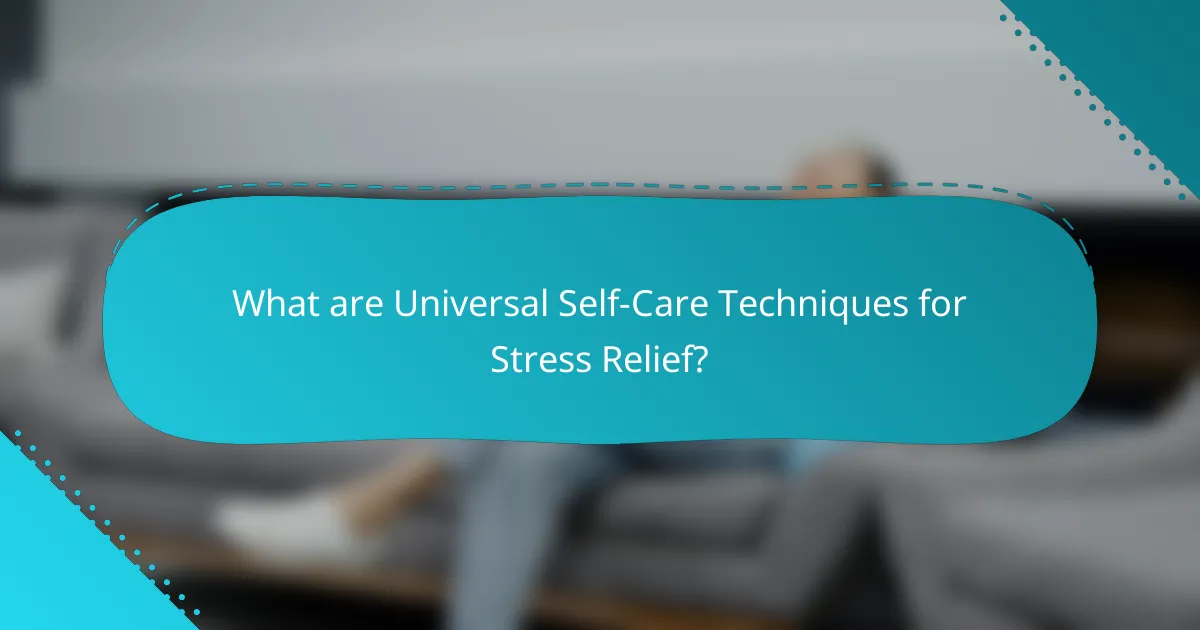
What are Universal Self-Care Techniques for Stress Relief?
Self-care techniques for stress relief empower women to enhance emotional well-being. Effective strategies include mindfulness practices, physical activity, and social connection.
Mindfulness, such as meditation or deep breathing, reduces anxiety and promotes relaxation. Regular physical exercise improves mood and releases endorphins, benefiting mental health. Engaging with supportive friends or family fosters a sense of belonging and reduces stress.
Incorporating these techniques into daily routines can lead to significant improvements in emotional resilience and overall well-being. Prioritizing self-care is essential for managing stress effectively.
How can physical activity enhance emotional well-being?
Physical activity significantly enhances emotional well-being by reducing stress and improving mood. Engaging in regular exercise releases endorphins, which are natural mood lifters. Studies show that women who participate in physical activities report higher levels of happiness and lower levels of anxiety. Additionally, group exercises foster social connections, enhancing feelings of support and belonging. This unique attribute of social engagement through physical activity is crucial for emotional resilience. As a result, incorporating exercise into self-care routines can empower women, promoting overall emotional health.
What types of exercises are most beneficial?
Aerobic exercises, strength training, and mindfulness practices are most beneficial for stress relief and emotional well-being. Aerobic exercises, like running or cycling, enhance cardiovascular health and release endorphins, reducing stress. Strength training builds resilience and boosts confidence. Mindfulness practices, such as yoga and meditation, promote relaxation and emotional balance. Incorporating these exercise types can significantly improve overall mental health.
What role does nutrition play in stress management?
Nutrition plays a crucial role in stress management by providing essential nutrients that support mental health. Balanced diets rich in fruits, vegetables, whole grains, and lean proteins enhance mood and reduce anxiety. For example, omega-3 fatty acids found in fish can lower stress levels. Additionally, magnesium-rich foods like nuts and leafy greens help regulate cortisol, the stress hormone. A well-nourished body can better cope with stressors, promoting overall emotional well-being.
Which foods should women prioritize for mental health?
Women should prioritize foods rich in omega-3 fatty acids, antioxidants, and vitamins for optimal mental health. Fatty fish like salmon provide omega-3s, which support brain function. Leafy greens and berries are high in antioxidants, reducing inflammation and oxidative stress. Whole grains and nuts offer essential vitamins and minerals that enhance mood stability. Incorporating these foods can lead to improved emotional well-being and stress relief.
How can sleep hygiene improve emotional resilience?
Improving sleep hygiene enhances emotional resilience by fostering better mental health and stress management. Quality sleep supports cognitive function, emotional regulation, and stress response. Research indicates that consistent sleep patterns can reduce anxiety and improve mood stability. Prioritizing sleep hygiene practices, such as maintaining a regular sleep schedule and creating a restful environment, empowers women to manage stress more effectively. This unique attribute of sleep hygiene not only benefits physical health but also strengthens emotional well-being, contributing to overall self-care strategies.
What are the best practices for achieving quality sleep?
To achieve quality sleep, establish a consistent sleep schedule and create a calming bedtime routine. Prioritize a sleep-conducive environment by minimizing noise and light. Limit screen time before bed to reduce blue light exposure, which can interfere with sleep quality. Incorporate relaxation techniques, such as deep breathing or meditation, to ease stress and promote restful sleep.

What Unique Self-Care Practices Empower Women?
Self-care practices that empower women include mindfulness, creative expression, and community engagement. Mindfulness techniques, such as meditation and deep breathing, enhance emotional well-being by reducing stress. Creative expression through art or writing fosters self-discovery and personal growth. Community engagement, like volunteering or joining support groups, builds connections and reinforces a sense of belonging. These unique strategies collectively promote resilience and overall mental health.
How can creative expression serve as a self-care tool?
Creative expression serves as a powerful self-care tool by enhancing emotional well-being and reducing stress. Engaging in activities like painting, writing, or dancing allows women to process feelings and communicate experiences. This form of self-expression can lead to increased self-awareness and confidence. Studies show that creative activities can lower cortisol levels, contributing to improved mental health. Additionally, unique attributes of creative expression include fostering community connections and providing a sense of accomplishment, which further supports emotional resilience.
What forms of creative activities are most effective?
Creative activities that promote self-care include art, music, writing, and dance. These forms effectively enhance emotional well-being and reduce stress. Engaging in art therapy can boost mood and foster self-expression, while music can elevate feelings of happiness. Writing, particularly journaling, allows for reflection and clarity. Dance serves as both physical exercise and a joyful outlet. Each activity uniquely contributes to mental health by providing an escape and a means of coping with stress.
What is the significance of community support in self-care?
Community support plays a crucial role in enhancing self-care practices for women. It fosters a sense of belonging, reduces feelings of isolation, and provides emotional encouragement. Engaging with supportive networks can lead to improved mental health outcomes and stress relief. For example, women participating in community groups report higher levels of emotional well-being and resilience. This unique attribute of community support amplifies the effectiveness of individual self-care strategies, making them more impactful.
How can women build supportive networks?
Women can build supportive networks by actively engaging with peers and fostering connections. Start by joining community groups or online forums focused on shared interests. Attend workshops and social events to meet like-minded individuals. Leverage social media platforms for networking opportunities. Establish regular meet-ups to strengthen relationships. Prioritize open communication and mutual support within the network. Engaging with diverse groups enhances emotional well-being and reduces stress.

What Rare Self-Care Strategies Should Women Consider?
Women should consider rare self-care strategies like forest bathing, art therapy, and sound healing. These techniques promote emotional well-being and stress relief through unique experiences.
Forest bathing immerses individuals in nature, reducing stress and enhancing mood. Research shows that spending time in green spaces can lower cortisol levels significantly.
Art therapy allows women to express emotions creatively, fostering self-discovery and healing. Engaging in artistic activities can improve mental health and provide a therapeutic outlet.
Sound healing utilizes vibrations from instruments like singing bowls to promote relaxation and emotional release. Studies indicate that sound therapy can reduce anxiety and improve overall mental clarity.
How can nature therapy benefit mental health?
Nature therapy can significantly enhance mental health by reducing stress and improving emotional well-being. Engaging with nature promotes relaxation, fosters mindfulness, and can lead to a decrease in anxiety levels. Research shows that spending time outdoors can lower cortisol levels, contributing to a more balanced mood. Additionally, nature therapy often involves physical activity, which further boosts mental health by releasing endorphins. By integrating nature therapy into self-care strategies, women can empower themselves to manage stress effectively and enhance overall emotional resilience.
What are the best ways to incorporate nature into self-care?
Incorporating nature into self-care enhances emotional well-being and reduces stress. Engage in outdoor activities like hiking or gardening to connect with the environment. Create a calming space with indoor plants to improve air quality and mood. Practice mindfulness in natural settings, allowing the sights and sounds of nature to promote relaxation. Use nature-inspired art or scents to evoke tranquility in your home.
What unconventional self-care techniques exist for stress relief?
Unconventional self-care techniques for stress relief include practices like forest bathing, sound healing, and laughter yoga. These methods encourage emotional well-being through unique experiences.
Forest bathing, or Shinrin-yoku, involves immersing oneself in nature to reduce stress and improve mood. Studies show it lowers cortisol levels and enhances feelings of tranquility.
Sound healing uses vibrations from instruments or voice to promote relaxation and mental clarity. Research indicates that sound therapy can reduce anxiety and foster emotional balance.
Laughter yoga combines laughter exercises with yoga breathing techniques. This practice boosts endorphins, creating a sense of joy and reducing stress levels effectively.
How can women explore alternative therapies?
Women can explore alternative therapies by researching various holistic practices that promote emotional well-being and stress relief. Techniques such as mindfulness meditation, yoga, and aromatherapy can enhance self-care routines. Each therapy offers unique benefits; for instance, yoga improves physical flexibility and mental clarity, while aromatherapy utilizes essential oils for relaxation. Engaging in these practices regularly can empower women to manage stress effectively and foster emotional resilience. Additionally, connecting with supportive communities or practitioners can enhance the experience and provide valuable insights.

How can Women Create a Personalized Self-Care Plan?
Women can create a personalized self-care plan by identifying their unique needs and preferences. Start by assessing stressors and emotional triggers. Include activities that promote relaxation, such as yoga, meditation, or journaling. Schedule regular self-care time and adjust as needed to ensure it remains effective. Incorporate a mix of physical, emotional, and social self-care strategies for a well-rounded approach.
What steps should be taken to assess personal needs?
To assess personal needs, start by identifying stressors and emotional triggers. Next, evaluate physical health, mental well-being, and social connections. Consider journaling to reflect on feelings and experiences. Finally, prioritize self-care activities that promote relaxation and joy.
How can women track their self-care progress?
Women can track their self-care progress by setting specific goals, utilizing journals, and employing apps designed for self-care tracking. Regularly assessing emotional well-being and physical health metrics enhances awareness of personal growth.
1. Define specific self-care goals, such as exercise frequency or mindfulness practices.
2. Maintain a self-care journal to document experiences and feelings.
3. Use mobile apps that offer reminders and track progress over time.
4. Schedule regular check-ins to evaluate emotional and physical health improvements.
What common mistakes should be avoided in self-care?
To enhance self-care, avoid common mistakes that hinder emotional well-being. Neglecting personal needs, overcommitting to obligations, and skipping self-reflection can lead to burnout. Prioritizing others over oneself diminishes effectiveness in self-care practices. Additionally, ignoring physical health, such as nutrition and exercise, can undermine stress relief efforts. Lastly, setting unrealistic expectations can result in disappointment and decreased motivation.

What Expert Insights Can Enhance Self-Care Practices?
Expert insights can significantly enhance self-care practices by offering tailored strategies that promote emotional well-being. Techniques such as mindfulness meditation, regular physical activity, and journaling are proven to alleviate stress. Research indicates that mindfulness can reduce anxiety levels by up to 30%. Additionally, establishing a consistent self-care routine fosters resilience and improves overall mental health. Engaging in community support groups provides social connection, which is a unique attribute beneficial for emotional stability. Prioritizing these expert-recommended practices empowers women to navigate stress effectively.
What do mental health professionals recommend for effective self-care?
Mental health professionals recommend several effective self-care strategies for women to enhance stress relief and emotional well-being. These strategies include regular physical activity, mindfulness practices, and establishing healthy boundaries.
Physical activity, such as walking or yoga, significantly boosts mood and reduces anxiety. Mindfulness practices, including meditation and deep breathing exercises, help cultivate awareness and emotional regulation. Establishing healthy boundaries in personal and professional relationships prevents burnout and promotes balance.
Additionally, maintaining a balanced diet rich in nutrients supports mental health. Social connections with supportive friends or groups provide emotional support and reduce feelings of isolation. Prioritizing sleep hygiene is crucial for overall well-being, as adequate rest enhances cognitive functioning and emotional stability.
How can women stay motivated in their self-care journey?
Women can stay motivated in their self-care journey by setting clear goals and celebrating small achievements. Establishing a routine that incorporates enjoyable activities enhances commitment. Connecting with supportive communities fosters accountability and inspiration. Tracking progress through journals or apps provides tangible evidence of growth, reinforcing motivation.
What are the best practices for sustaining self-care routines?
To sustain self-care routines, prioritize consistency, set realistic goals, and create a supportive environment. Incorporate practices like mindfulness, physical activity, and adequate rest. Track progress to maintain motivation and adjust as needed for effectiveness. Engaging in social connections enhances emotional well-being, reinforcing commitment to self-care.
